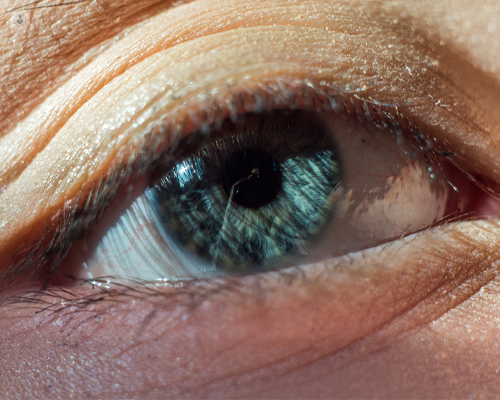Diabetes: How does it affect the eyes?
Written by:Uncontrolled blood sugar and high blood pressure, along with other risk factors, can mean patients suffering from diabetes are more likely to develop complications affecting eye health and vision. In this informative article, highly respected consultant ophthalmologist Dr Rupal Morjaria offers expert insight on the most common eye-related complications of diabetes.

What is diabetic retinopathy?
Diabetic retinopathy is the fifth most common cause of blindness in the world and a major cause of blindness among the working population in developed countries. Diabetic retinopathy is treatable and vision loss can be prevented or delayed if treated early.
Diabetic complications in the eye occur due to the effects of poor blood sugar control together with other risk factors such as high blood pressure, high cholesterol and smoking. It can result in mild diabetic changes such as a few haemorrhages that do not require treatment but do need monitoring. More severe disease, which causes bleeding, new vessels in the eye or fluid build-up in the camera film of the eye, require treatment.
How is diabetes and glaucoma connected?
People who suffer with diabetes are at a higher risk of developing glaucoma. This occurs when the pressure in the eye is too high and can cause damage to the nerve sending messages to the brain. If this is not detected early, it can cause changes in your field of vision. It is important that the doctor monitoring your eyes for diabetes also checks the pressure of the eye and the nerve at the back of the eyes.
What is the connection between diabetes and cataracts?
A cataract is a cloudy lens. The lens helps to focus images from the outside world onto a small part of the camera film called the fovea. As people get older, their lens gets thicker and ‘yellower’. Having fluctuating blood sugars can expedite this process and people with diabetes may require cataract surgery earlier than others.
How do you achieve the best outcomes for patients with diabetes?
I specialise in seeing patients with diabetes and cataracts and am thorough to take additional steps to avoid swelling and inflammation after surgery. In my own practice, I always fully assess the eye for risks of post-operative macular oedema before my patients undergo any type of surgery.
People with diabetes may need additional treatments during or after surgery to help them get the best outcome. Sometimes additional injections of anti-VEGF agents or steroids are needed at the time of cataract surgery to help get optimal results, but discussing the risks and benefits of these treatments is an essential part of my conversations with patients.
Dr Morjaria is one of the UK’s leading consultant ophthalmologists that specialises in the treatment of cataracts in patients with diabetes. If you wish to schedule a consultation with Dr Morjaria. you can do so by visiting her Top Doctors profile.


